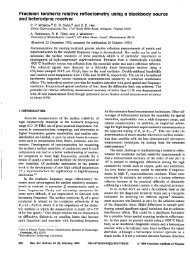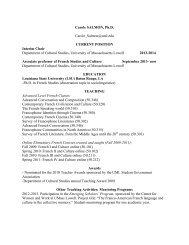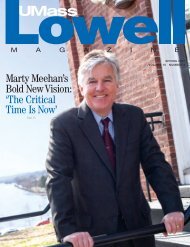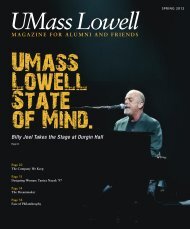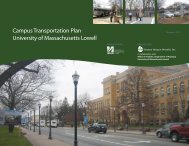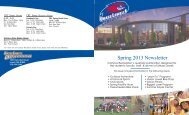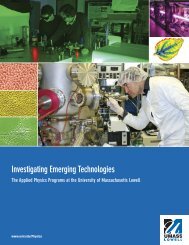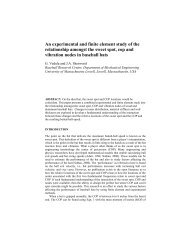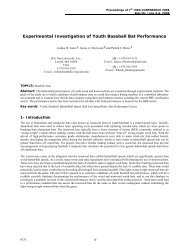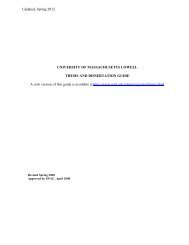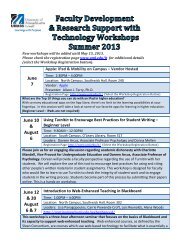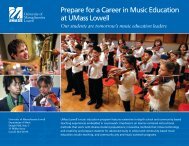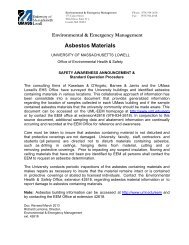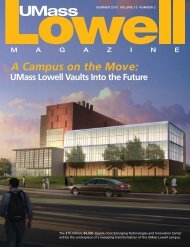Summer 2011 - University of Massachusetts Lowell
Summer 2011 - University of Massachusetts Lowell
Summer 2011 - University of Massachusetts Lowell
Create successful ePaper yourself
Turn your PDF publications into a flip-book with our unique Google optimized e-Paper software.
C A M P U S N E W S<br />
Giles was named UMass <strong>Lowell</strong>’s <strong>University</strong> Pr<strong>of</strong>essor<br />
in May 2010. He was recognized, in particular,<br />
for his work as director and principal investigator at<br />
UMass <strong>Lowell</strong>’s Submillimeter-Wave Technology Laboratory.<br />
The lab, which recently received a five-year, $27<br />
million renewal grant from the U.S. Army’s National<br />
Ground Intelligence Center, is leading the way in developing<br />
transmitter and receiver technologies in the areas<br />
<strong>of</strong> military surveillance, homeland security and medical<br />
diagnostics.<br />
His latest research involves the use <strong>of</strong> high-frequency<br />
microwaves to “see through” clothing to reveal any<br />
hidden weapons or explosives; a portable radar system<br />
that allows soldiers in the field to tell whether an activity<br />
is friendly or hostile; and a safe, non-invasive technique<br />
for detecting different types <strong>of</strong> human skin cancers.<br />
Pr<strong>of</strong>. Robert Giles climbs<br />
to the ro<strong>of</strong> <strong>of</strong> a building in<br />
the Haitian rural town <strong>of</strong><br />
Sukeri Anri to upgrade<br />
the building’s solar panels.<br />
Electricity is rare in the outlying<br />
regions <strong>of</strong> the country.<br />
PROFESSOR ON HAITI:<br />
‘A FOURTH-WORLD COUNTRY<br />
WITH FIRST-WORLD POSSIBILITIES’<br />
<strong>University</strong> Pr<strong>of</strong>essor Robert Giles, chair <strong>of</strong> the Physics and Applied Physics Department,<br />
is walking the walk when it comes to promoting science education and cutting-edge<br />
research both here at UMass <strong>Lowell</strong> and abroad.<br />
Giles has been leading an effort to initiate a development studies research team in<br />
Haiti since 2001, and visited Port-au-Prince in January, a year after the devastating<br />
earthquake there.<br />
“The pictures depict a distressed, impoverished country beyond self-repair,” he says.<br />
“But it’s a society, culture and people that I have grown to love. I travel to Haiti to<br />
develop a first-hand relationship and understanding <strong>of</strong> the country. A fourth-world<br />
country by International Banking System standards, I believe Haiti has first-world<br />
possibilities by virtue <strong>of</strong> its geographical location in the Caribbean.”<br />
Giles has been encouraging Haitian high-school students to explore their academic<br />
abilities and opportunities in higher education through the use <strong>of</strong> introductory collegelevel<br />
science curricula. He has also been submitting proposals to funding agencies in an<br />
effort to establish this project team as a research center at UMass <strong>Lowell</strong>.<br />
“Once I was told by a missionary that ‘you must stand where they stand and sit where<br />
they sit to understand the poor in this world,’” he says. “Now having the privilege <strong>of</strong><br />
many 10-day visits to Haiti, my Haitian friends, journeys and stories create a foundation<br />
<strong>of</strong> experience that has changed my life to its core.”<br />
Pr<strong>of</strong>. David Lewis, right, and daughter Brittany<br />
PROFESSOR SPENDS WINTER BREAK<br />
HELPING IN HAITI<br />
David Lewis, a pr<strong>of</strong>essor in the College <strong>of</strong> Management,<br />
spent a week in January engaged in tasks like stripping<br />
metal from shattered concrete, comforting babies in an<br />
orphanage and building giant filters to create potable<br />
water.<br />
Lewis and his 22-year-old daughter, Brittany, were<br />
volunteers with All Hands, a grassroots relief organization<br />
whose members have spent the last year working to<br />
help Haiti recover from the destruction left behind by a<br />
7.0-magnitude earthquake that struck on Jan. 12, 2010.<br />
That quake and the more than 50 aftershocks that followed<br />
over the next two weeks killed an estimated<br />
300,000 citizens, injuring hundreds <strong>of</strong> thousands <strong>of</strong> others<br />
and leaving more than 1 million people homeless.<br />
The Lewises traveled through the heart <strong>of</strong> Port-au-<br />
Prince en route to Leogane, seeing in person some <strong>of</strong> the<br />
most dramatic images <strong>of</strong> the damage they had seen on<br />
TV: the National Palace, the Port-au-Prince Cathedral<br />
and the National Assembly, all in ruins. “It was just like<br />
you were in the news,” says Lewis. “It was shocking.”<br />
S U M M E R 2 0 1 1 UMASS LOWELL MAGAZINE 7



